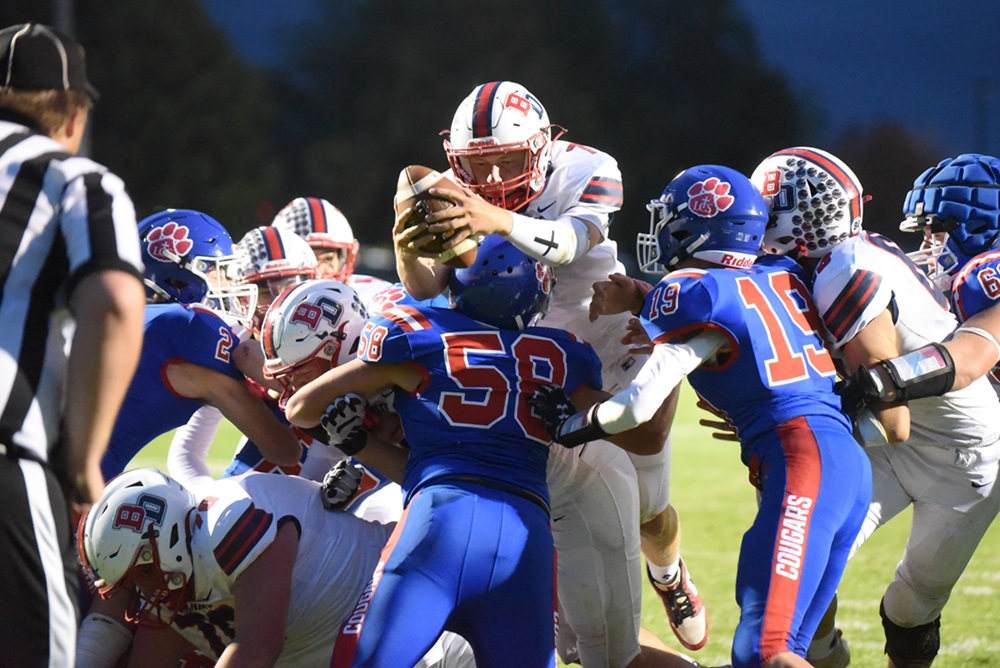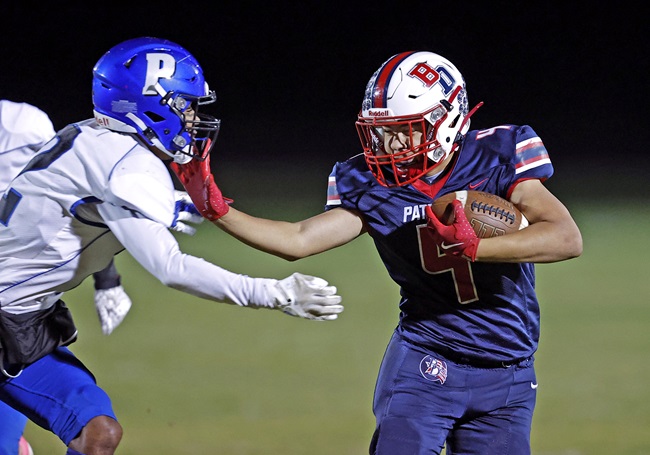
NFHS Voice: Football Continues to Thrive
September 25, 2019
By Karissa Niehoff
NFHS Executive Director
When the annual High School Athletics Participation Survey was released by the National Federation of State High School Associations (NFHS) in August, many headlines across the country focused on the drop in the number of boys playing 11-player football. After all, the report showed 30,829 fewer participants than the year before. However, perhaps the most important number was overlooked – 14,247.
Yes, 14,247, the number of high schools with 11-player football teams. While there was a slight decline in the number of participants in many states, the number of schools sponsoring the sport was the highest in five years. In fact, the number of schools last year with 11-player teams has only been topped twice in the survey’s history – 14,262 in 2013-14 and 14,279 in 2010-11.
In addition, smaller schools in some states have shifted to 6-player, 8-player and 9-player football and have had good responses. The survey indicates an additional 156 schools and 1,594 participants involved in these alternate forms of the sport; and, in the past 10 years, participation by girls in 11-player football has doubled, with more than 2,400 participants this past year.
These numbers express the desire by high schools to keep alive one of the oldest and most treasured traditions in our nation – Friday Night Football Under the Lights. Although there are many options today for the entertainment dollar, nothing surpasses supporting the local high school football team on Friday nights. The No. 1 fan base in America? The answer is that number again – 14,247.
In Week 2 of the National Football League season, just under 1.1 million fans attended the 16 games. While impressive, it doesn’t come close to the number of fans who watched high school football during the corresponding week. It’s all in that number – 14,247.
With approximately 7,123 games every Friday night (14,247 divided by 2), and with a conservative estimate of 1,000 fans per game, there are more than 7 million fans in high school football stadiums every week. An unofficial attendance survey conducted by the NFHS in 2011 indicated about 165 million fans attended high school football games during that season, which included up to five weeks of playoffs and a weekly average of 11 million fans. Either way, the number of fans at high school football games dwarfs the numbers attending professional football games.
Early season crowds have been strong in many areas of the country with terrific fall weather – filled by current and former students; parents, grandparents and friends of players on the team; and longtime fans and supporters in the community. Unlike crowds at the college and professional levels where fans have little, if any, identity with the players, there is a connection between the players and fans at the high school level.
With concussion protocols and laws in place in every state, with a reduction in contact levels before the season and during practices, and with teaching of proper tackling skills at lower levels, we believe people, including parents of high school student-athletes, are seeing and believing that the sport of football at the high school level is as safe as it ever has been.
We urge you to support your local high school football team this Friday night.
Dr. Karissa L. Niehoff is in her second year as executive director of the National Federation of State High School Associations (NFHS) in Indianapolis, Indiana. She is the first female to head the national leadership organization for high school athletics and performing arts activities and the sixth full-time executive director of the NFHS, which celebrated its 100th year of service during the 2018-19 school year. She previously was executive director of the Connecticut Association of Schools-Connecticut Interscholastic Athletic Conference for seven years.

Seeing is Believing as Confident Britton Deerfield Playing for Finals Trip
By
Doug Donnelly
Special for MHSAA.com
November 12, 2024
A little confidence can go a long way. A lot of confidence could get you to the state championship game.
 Britton Deerfield is enjoying a remarkable turnaround season this year and will host Morrice for an 8-Player Division 2 Semifinal on Saturday.
Britton Deerfield is enjoying a remarkable turnaround season this year and will host Morrice for an 8-Player Division 2 Semifinal on Saturday.
Last year at this time, head coach Erik Johnson was shaking off the pain of a 2-7 season.
“It’s a great story,” Johnson said. “You go 2-7 and, really, last year, the last five weeks of the year we weren’t even in the game. We were getting blown out by halftime in most of those games.
“For those kids to have the resolve and come back and have the kind of success they are having this year is just great to see.”
Britton Deerfield is in its fourth season of 8-player football and having its best season yet. The Patriots have won nine straight games heading into Saturday’s Semifinal against Morrice and have set a school record for points scored in a season. Over the last six weeks, they are averaging 60.3 points per game and set the school’s single-game scoring record.
Senior Luke Wiser said the difference from last season is the team’s confidence.
“It’s all in the mindset,” Wiser said. “Last year we didn’t have the great confidence we have now.”
BD struggled early this season until that confidence kicked in. The Patriots defeated Pittsford in Week 1 but gave up 58 points. They lost in Week 2 to Mendon, giving up 66 points.
Johnson went to the defensive drawing board and challenged his players to get better.
“We talked a lot about the mental aspect of tackling,” he said. “They’ve been tackling since middle school. They’ve been through every tackling drill you can do. Now, it’s about the mental part of football, wrapping up and making the play.”
Over the next two weeks BD held Colon and Concord to one touchdown each.
The new Patriots offense started to soar as well. Johnson had favored a spread offense with a lot of jet sweeps and the quarterback alternating running and throwing the ball. In the offseason, he made a change.
“I knew we were going to have a stable of kids who could run the ball and a couple of different kids who could throw the ball, so I started to think of how I could maximize their efforts,” he said. “We went to more of a single wing offense. I watched a video series about the single wing and worked on ways to adjust that to make it work for our 8-man game.”
The single wing look requires the center to snap the ball to one of three backs and none playing the traditional role of quarterback. The results have been great.
The Patriots have rushed for 68 touchdowns this season and average 7.9 yards a carry. Wiser has rushed for 1,549 yards and scored 27 touchdowns. Caden Freeman has rushed for 806 yards, Caden Kubacki 666 and Cayden Allshouse 569.
 Wiser credits the BD offensive line.
Wiser credits the BD offensive line.
“It’s almost like I’m not running,” he said. “I follow my blocks and break off a run, but I think they really do an outstanding job, and our offense moves through them.”
Johnson said as the linemen settled in this season, they started to come to him to suggest different things.
“You know things are going well when the kids see something on the field and come talk to the coaches about it,” he said. “I’ll just say, ‘Yeah, let’s give that a try.’”
On defense, seniors Hunter Kniffin and Jayden Brooks lead the Patriots in tackles. Junior Liem Roe has eight interceptions.
In the first round of the playoffs, BD knocked out Adrian Lenawee Christian, which had won three Finals championships over the last four years. That, in itself, turned some heads.
“To beat LCS was huge for our confidence,” Johnson said. “We have been able to beat some teams that have had our number. LCS had handled us in every game we have had with them until this year.”
BD has eight seniors who have stepped into leadership roles. Juniors who played a lot as sophomores are contributing too.
“We had some younger guys in the backfield last year, but those guys have all grown up,” Johnson said. “The seniors have done an outstanding job of being there, ever since summer. When all of your seniors are there, that feeds down through the program. Other kids see that.”
Johnson said four years ago he couldn’t have predicted the current group of seniors would be where they are today.
“Some of those kids didn’t even play when they were a freshman,” he recalled. “It’s been a pleasant surprise to watch that group mature, and to see them now have success is awesome.”
The Patriots captured the first Regional championship for the program since Britton and Deerfield combined to form one high school in 2010.
From 1993 to 2010, the two schools played a cooperative football program and reached the 11-Player Semifinals in 1999 and 2000. A photo hangs in the school showing a huge crowd ringing the field during the playoff runs those seasons.
The team plays in a new stadium, just a few hundred yards from the old stadium, which is now the practice field.
“The crowd was great,” Johnson said of the Regional championship win over Pittsford. “They were into it. They stayed until after the trophy presentation and celebrated. It was great.”
If Britton Deerfield wants to get to the Division 2 championship game Nov. 23 in Marquette, the Patriots will need that crowd and confidence when they face the 10-1 Orioles this weekend.
“Our kids are really confident,” Johnson said. “That’s a good thing. You get that feeling like you can’t be stopped, and you can win every game you play. That’s good to have.”
 Doug Donnelly has served as a sports and news reporter and city editor over 25 years, writing for the Daily Chief-Union in Upper Sandusky, Ohio from 1992-1995, the Monroe Evening News from 1995-2012 and the Adrian Daily Telegram since 2013. He's also written a book on high school basketball in Monroe County and compiles record books for various schools in southeast Michigan. E-mail him at [email protected] with story ideas for Jackson, Washtenaw, Hillsdale, Lenawee and Monroe counties.
Doug Donnelly has served as a sports and news reporter and city editor over 25 years, writing for the Daily Chief-Union in Upper Sandusky, Ohio from 1992-1995, the Monroe Evening News from 1995-2012 and the Adrian Daily Telegram since 2013. He's also written a book on high school basketball in Monroe County and compiles record books for various schools in southeast Michigan. E-mail him at [email protected] with story ideas for Jackson, Washtenaw, Hillsdale, Lenawee and Monroe counties.
PHOTOS (Top) Britton Deerfield’s Caden Kubacki, with the ball, stretches forward for extra yardage against Adrian Lenawee Christian. (Middle) Luke Wiser (4) takes on a Pittsford tackler. (Top photo by Deloris Clark-Cheaney. Wiser photo by John Discher.)

